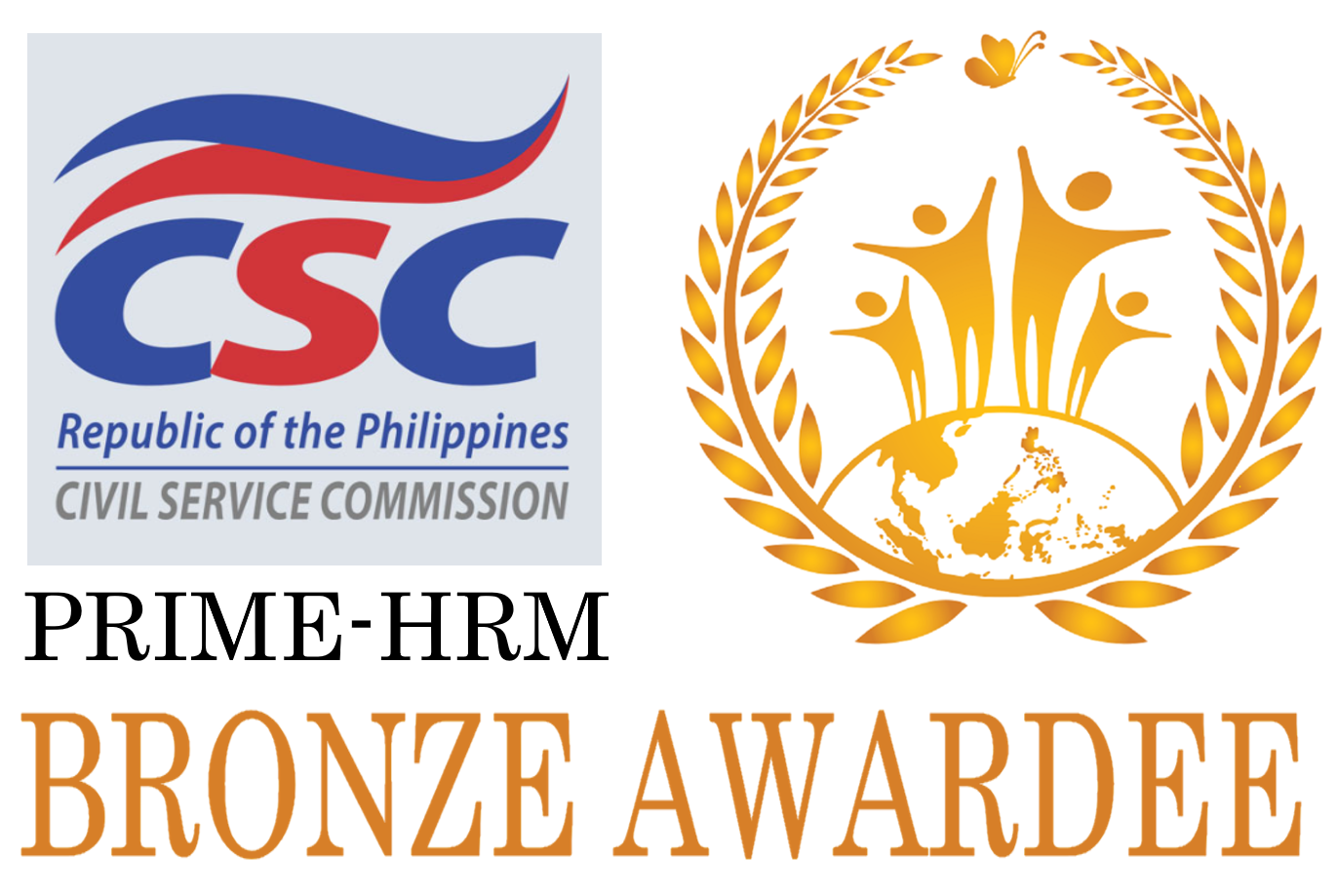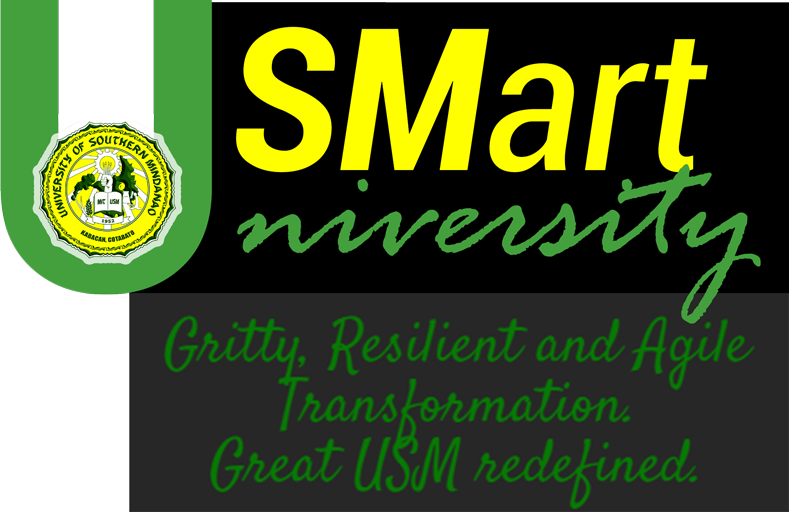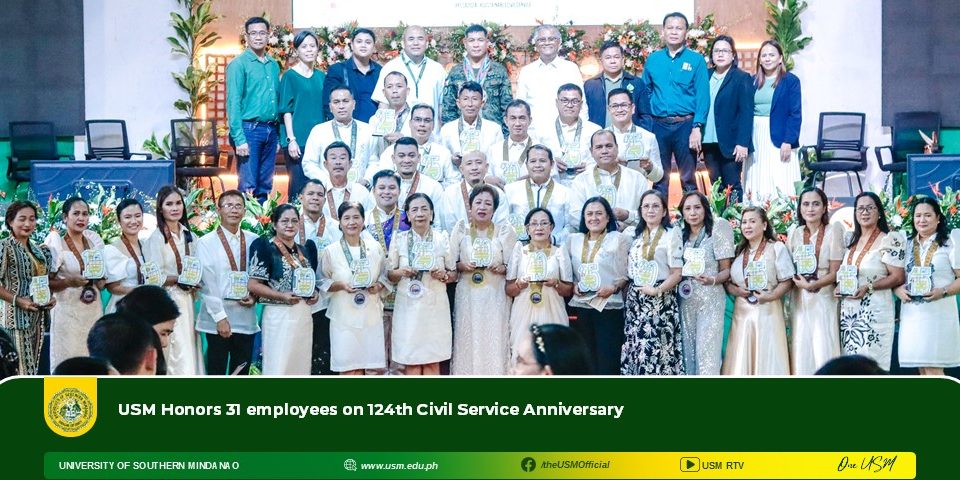Caring Careers. Supporting Excellence.



The Human Resource Management and Development Office is the main service arm of the university mandated to take charge in the administration of effective human resource management and development of faculty, research, extension, production and administrative support personnel. The main services of the office include: Recruitment; Selection; and Placement (RSP); Learning and Development (L&D); Compensation; Benefits; Rewards and Recognition (CBR); Performance Management (PM); Welfare, Policy and Technology Support (WPTS).
Per Resolution 2200806, the Civil Service Commission granted the university the Bronze Award in the Program to Institutionalize Meritocracy and Excellence in Human Resource Management (PRIME-HRM) after meeting the maturity level 2 indicators in RSP, PM, L&D, R&R. The office is also supported by the Office of University President as one of the pillars of the Smart University Initiative to hone agile and future-ready human resources.
HRMDO advises the University President on human resource policy and administration including proper implementation of Civil Service Rules and Budget Circulars on compensation, reclassification and salary adjustments.
What's New
USM Honors 31 Employees on 124th Civil Service Anniversary
The University of Southern Mindanao (USM) through the Human Resource Management and Development Office (HRMDO) conferred fifteen (15) Kakaw Awards, nine (9) Goma Awards, and seven […]USM joins DAP’s 26th Productivity Challenge Workshop
A university team joins the 26th Productivity Challenge Workshop: Discovering and Designing Productivity Solutions facilitated by the Development Academy of the Philippines (DAP) on September 20, […]Saliling discusses HR best practices in 18th RCHRP Convention
Engr. Willie Jones B. Saliling, Chief Learning Architect of the Linang Tao Academy and former HRMDO Director presented the best practices in human resources management of […]
Recruitment, Selection, and Placement
HRMDO employs data analytics in rationalizing the screening, hiring and promotion of the university personnel. It also serves as the secretariat of both the Faculty Selection Board (FSB) and the Human Resource Merit Promotion and Selection Boards (HRMPSBs).
The FSB composed of the Vice President for Academic Affairs, Director for Instruction, President of the USM Faculty Association, HRMDO Director, and one of the University Professor designated assist the University President in the recruitment and promotion of faculty members. During the recruitment, the regular members are joined by the College Deans, Department Chair and the highest ranking Professor of the Department.
2020 and after, the approval of the faculty merit selection plan, recruitment and promotion has become competency-based: core, leadership and technical competencies including instruction, research, extension and production.
Annual evaluation is also done by the FSB to screen candidates for promotion through a task force jointly organized by the USMFA and the HRMDO. The initial evaluation of the task force serves as the basis for the FSB final evaluation. Candidates for promotion are assessed according to their competencies, individual performance commitment rating (IPCR), and service/loyalty. Thus, promotion is based on competency, performance and loyalty. In addition, faculty members are evaluated once every three years following the NBC 461 rules. The result forms the basis for the reclassification of faculty members.
On the other hand, the recruitment and promotion of the non-teaching personnel are facilitated by at least six (6) HRMPSBs: (a) Executive/ Managerial positions, (b) general administrative and support services, (c) research, development and extension services, (d) resource generation and entrepreneurial services, (e) Academic Support Services, and (f) each for the autonomous campuses. HRMPSBs are chaired by the vice presidents of the functional groups or the chancellor for the autonomous campuses. The other members of the HRMPSBs are representatives of USM Academic Support Staff Association (USMASSA) for first and second level, HRMDO Director and the unit head. The competency framework of the non-teaching staff is under revision.
The university employs proactive recruitment strategies including Service Initiative for Teaching and Learning Innovation and Development of Knowledge (SINTIDO) and the Agile Support Services Initiative for System Transformation (ASSIST) Boot Camps. SINTIDO and ASSIST completers are enrolled in the talent bank. These boot camps also serve as the digital onboarding.
Candidates for recruitment and promotion are evaluated through the Dynamic Candidates Assessment System (DYCAS) – a novel data-driven system employing the nine-grid assessment for potential and performance. Executive and managerial positions in the non-teaching are evaluated through the Executive Leadership Induction towards System Transformation (ELIST). Meanwhile, professorial candidates are evaluated through the Productivity and Results-Oriented Framework for Evaluating Sustained and Impactful Scholarship (PROFESS).
Above all, RSP of both faculty and staff are governed by the Omnibus Rules of Appointments and other Human Resource Actions (ORAOHRA). In addition, HRMDO assists the University in the issuance and maintenance of database of special orders of designation.
Finally, the HRMDO, though its Focal Person on Service Contracting, also assists the Bids and Award Committee in the transition from hiring JO and COS to the procurement of services pursuant to CSC-COA-DBM Joint Circular 1 s 2017 as amended by JC 1 s 2018.
Relevant Links
Learning and Development
Workplace is fast evolving and the demands of the clients and oversight agencies are ever changing. In order to achieve the strategic goals of the university, its personnel have to be equipped with competencies aligned to the goals of the organization. The Linang Tao Learning and Development Management System (LDMS) of USM supports the achievement of individual pursuits in the hope that it can collectively help in the achievement of the university’s goal.
The Linang Tao LDMS follows the 70-20-10 model in its interventions: workplace learning, peer learning, and formal learning. The centerpiece of the university’s L&D is the Linang Tao Academy. The academy hosts online learning management platforms to cater proactive recruitment and digital onboarding, progressive layering competency enhancement, workplace innovation hubs, and career lifelong learning.
Progressive layering competency courses include SINTIDO and ASSIST courses from 2nd to 4th levels of competencies. SINTIDO stands for Service Initiative for Nurturing Teaching and Learning Innovation and Development of Knowledge (for faculty) while ASSIST stands for Agile Support Services Initiative for System Transformation (for non-teaching).
The workplace innnovation hubs gather groups of personnel to collaborate, think and design innovations in the workplace to enhance service delivery.
From the personnel competency gaps assessed by the Learning and Development Plans, trainings are designed. In partnership with other units, HRMDO conducts trainings at the same time monitors the same in accordance with the approved learning and development plan. All trainings are monitored by the HRMDO. Training certificates are controlled by the office to ensure effective monitoring and evaluation. Training effectiveness is assessed three months after each training.
Aside from competency, performance gaps as shown in the individual performance metrics can be incorporated in the learning and development plan.
The university also invests in long-term scholarship grants for faculty and non-teaching personnel to pursue advanced degrees. Through this, the faculty profile and educational attainment of personnel are improved. Aside from scholarship grants, thesis grants and semestral study support grants are made available. Requests for scholarships are coursed through the Faculty Training and Development Committee (FTDC) and through the Human Resource Development Council (HRDC) for faculty members and non-teaching personnel respectively.
Relevant Links
Compensation, Benefits, Rewards and Recognition
HRMDO assures the timely disbursement of salary and other benefits of personnel. It also constantly liaises the fringe benefits of personnel liaises with GSIS, PHIC, and HDMF for. It also facilitates claims and retirement benefits of the retirees.
The office also administers the Leave Privileges of personnel pursuant to the Omnibus Rules on Leave. It also calculates and plans out the commencement of teacher’s leave.
Through the Program on Awards and Incentives for Service Excellence (PRAISE), rewards and recognition are instituted for the university. The Gawad Uliran sa Serbisyong Mahusay (Gawad USM) recognizes exemplary performance of units groups, and individuals. The result of the performance metrics serves as the basis in determining outstanding employees and units. This way, any personnel who performs his/her functions is given due recognition during the annual civil service anniversary. Length of service awardees are also recognized in the same occasion. The university also recognizes retirees through the Saludo Retirado, Bisita Retirada program.
HRMDO serves as secretariat of the PRAISE Committee.
Relevant Links
Leave Form | PRAISE Manual | Nomination Form | 2022 Saludo Retirado, Bisita Retirada | 2021 Saludo Retirado, Bisita Retirada
Performance Management
HRMDO plays an important role in the implementation of Strategic Performance Management System (SPMS). While the Planning and Development Office serves as the steering secretariat in the fulfillment of the University goals, HRMDO supports PDO’s endeavor of igniting the passion for performance of its individual personnel.
HRMDO takes the lead in reviewing and calibrating the Individual Performance Commitment Rating (IPCR) to conform and align to the organizational performance. Embedded in the IPCR are the competencies, so that performance plans are graduated according to ranks and salary grades. This will come to conclude that the higher the salary of the personnel, the higher performance is expected from him/her.
A web-based SPMS is currently being developed to track real time performance of personnel. With the development of Enhanced Daily Time Record (EDTR) integrating activities of personnel, performance outputs are tracked and monitored. Unit heads will then be trained to coach subordinates to perform better. After each rating period, unit heads will recommend performance achievers for rewards and recognition and dismal performers for learning and development.
In coordination with UICTO, the faculty performance evaluation system (FPES) is developed for students to evaluate their professor. The result of the FPES is reflected in the IPCR.
Relevant Links
Welfare, Policy, and Technology Support
HRMDO keeps abreast of the different issuances of the Civil Service Commission and other oversight agencies. In this way, the office sees to it that its administration is within the legal bounds.
HRMDO also serves as secretariat of the Personnel Discipline Committee to ensure that personnel are performing according to the norms and decorum fit for a civil servant in pursuant to the Revised Rules on Administrative Cases in the Civil Service.
The office also supports the organization of personnel by conducting consultation thereof for the welfare of the rank-and-file. In order to make sure that their rights are heard and exercised. The office also promotes health and to its personnel by requiring at least two hours of health and wellness activities a week.
HRMDO also uses information technology to support other HRM functions including the generation of biometric and online DTR reports, automated faculty performance evaluation system, training certificates generation, SO designations database, and DBM PSISOP database updating. It is the objective of the office to completely automate processes within the office.
On the pipeline of development is the Yamang Tao HRIS that integrates PM, L&D, RSP, R&R and other HR systems.
HRMDO Team
| Name | Position |
|---|---|
| Nerissa G. Dela Viña | Director and Associate Professor I |
| Marlon L. Marquez | Admin Officer IV; Learning and Development Coordinator, SINTIDO Secretariat |
| Marevie B. Satorre | Admin Assistant II; Compensation and Benefits Support, Payroll Incharge (COS-Teaching Personnel) |
| Marcelina B. Borres | Admin Officer II; Compensation, Benefits, Rewards, and Recognition Coordinator, Liaison Officer (PAG-IBIG, GSIS, and PHILHEALTH) |
| Venus G. Maongco | Admin Officer II; Payroll Incharge (Permanent Personnel) |
| Bernalou M. Malaque | Admin Assistant II; Performance Management Support, Leave administration |
| Dennis F. Sarmiento | Admin Aide VI; Payroll Incharge (COS/JO Personnel), Job Order request Pre-auditor |
| Jean P. Saramosing | Admin Aide VI; Recruitment, Selection, and Placement Coordinator, Special Order Incharge |
| Ella Mae D. Santos | Office Clerk; Document Controller, Contracting Support |
| Vincent Philip D. Torres | Office Clerk; Document Controller, Digital Archiving Support |
| Jessa Mae M. Cascaro | HR Verifier; Document Controller, Payroll Support |
| Jayson D. Ty | Office Clerk; Document controller, Information Technology Assistant |
| Sweetheart B. Sabanal | Office Clerk; Document Controller, Special Order Incharge |
| Willie Jones B. Saliling | Faculty Association President/ Regent; Professor and Chief Learning Architect, Linang Tao Academy |

